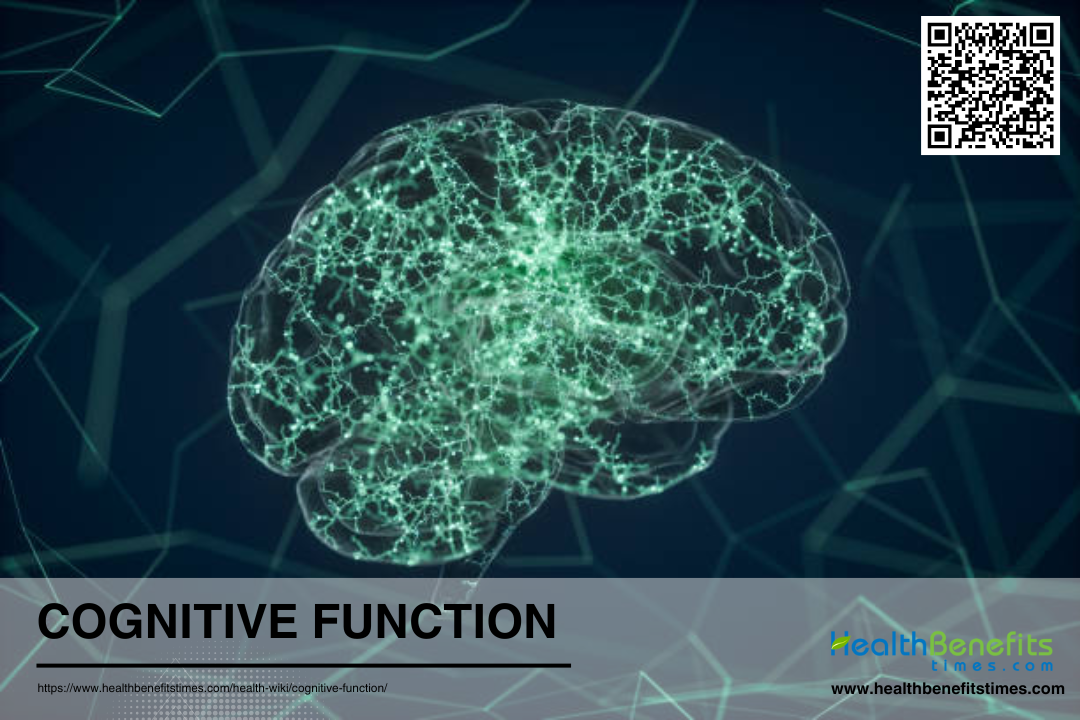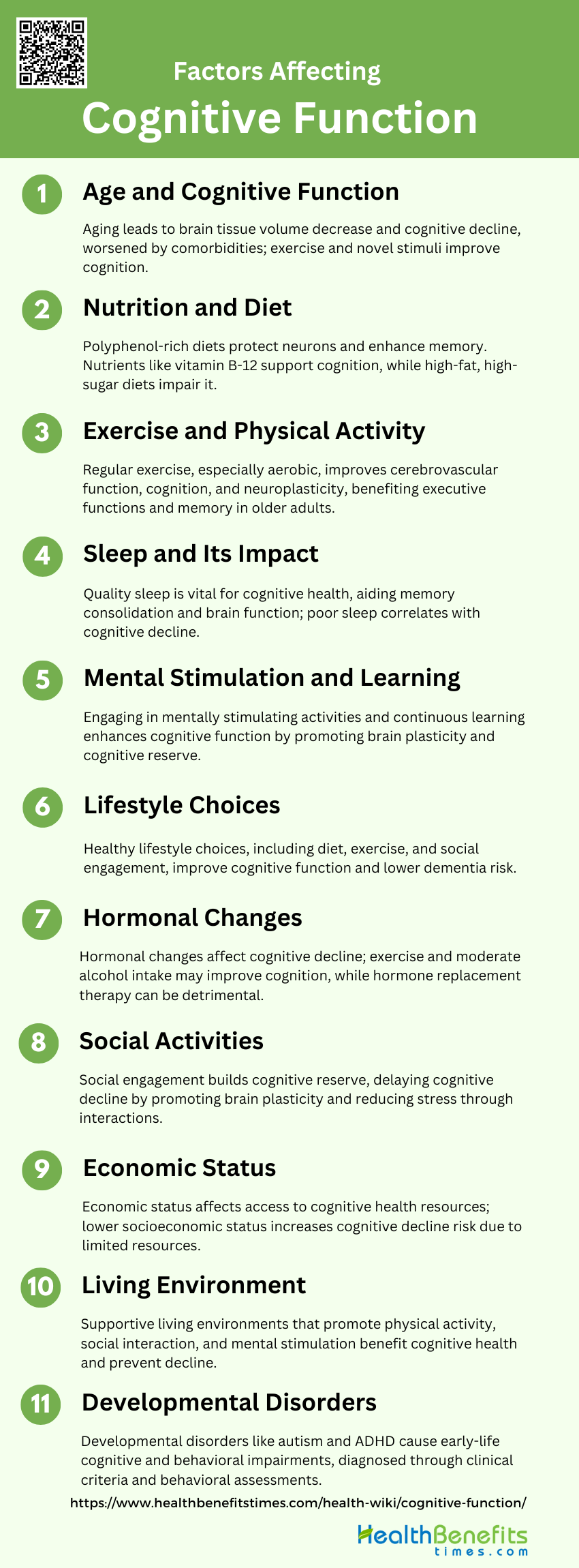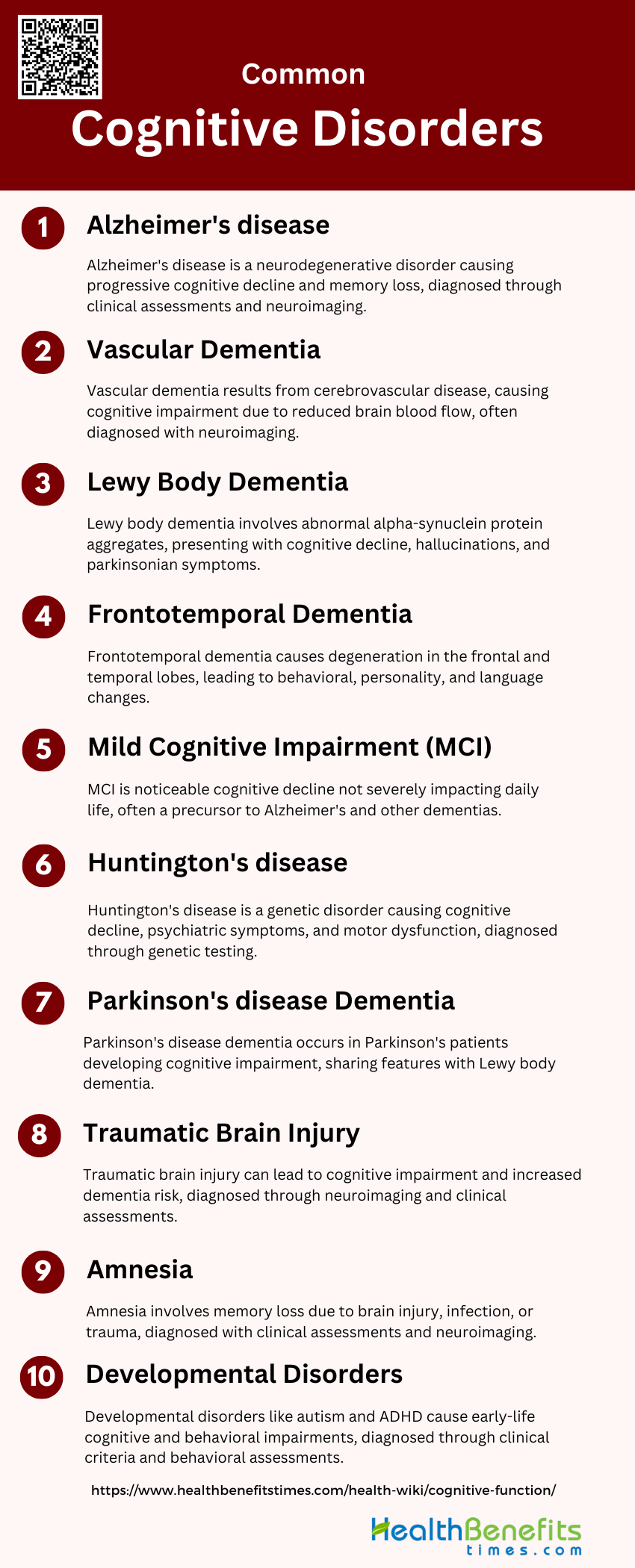Cognitive function refers to the mental processes involved in acquiring knowledge, understanding, and interacting with the world around us. It encompasses a wide range of abilities, including perception, attention, and memory, language, learning, reasoning, problem-solving, and decision-making. These functions work together to enable individuals to process information, form thoughts, and carry out various tasks in their daily lives. Cognitive functions are essential for human behavior and are supported by different areas of the brain. They can be influenced by various factors such as age, health, environment, and lifestyle. Understanding cognitive functions is crucial in fields like psychology, neuroscience, and education, as it helps in assessing mental capabilities, diagnosing cognitive disorders, and developing strategies to enhance cognitive performance
Types of Cognitive Functions
These functions can be broadly categorized into executive and non-executive functions, each playing a crucial role in our daily lives.
1. Executive Functions
Executive functions are high-level cognitive processes that enable individuals to plan, make decisions, solve problems, and regulate behavior. These functions include working memory, cognitive flexibility, and inhibitory control. They are essential for goal-directed activities and are often associated with the prefrontal cortex of the brain. Executive functions allow us to manage time, pay attention, switch focus, and control impulses, which are crucial for complex tasks such as organizing a project or navigating social interactions.
2. Non-Executive Functions
Non-executive functions encompass a range of cognitive processes that support everyday activities but do not involve high-level planning or decision-making. These include basic cognitive abilities such as perception, attention, memory, and language skills. Non-executive functions are fundamental for interpreting sensory information, maintaining focus, recalling past experiences, and understanding and producing language. These functions are typically more automatic and less consciously controlled than executive functions, yet they are equally vital for effective functioning in daily life.
Importance of Cognitive Function
These functions are crucial for effective daily living, work performance, and overall quality of life. Here are some key reasons why cognitive function is important:
1. Enables Daily Functioning and Independence: Cognitive function is crucial for performing everyday tasks and maintaining independence, as it involves executive functions, memory, and attention.
2. Supports Learning and Memory: Cognitive processes such as working memory and long-term memory are fundamental for learning and retaining information.
3. Facilitates Problem-Solving and Reasoning: Cognitive control and attentional functions are essential for problem-solving and reasoning, enabling individuals to navigate complex situations and make informed decisions.
4. Enhances Attention and Focus: Attention and focus are critical components of cognitive function, allowing individuals to prioritize and process relevant information efficiently.
5. Enables Language Comprehension and Communication: Language comprehension and communication are key aspects of cognitive function, involving the processing and production of language.
6. Supports Social Interactions: Social cognitive skills, such as understanding and responding to others’ emotions, are vital for successful communication and mental health.
7. Preserves Quality of Life in Aging: Maintaining cognitive function is important for preserving quality of life in aging, as it supports independence and overall well-being.
8. Improves Academic and Work Performance: Cognitive abilities such as executive function, memory, and attention are linked to success in academic and work environments.
9. Enhances Decision-Making: Decision-making processes are heavily reliant on cognitive functions, including attention, memory, and executive control.
10. Supports Mental Health: Cognitive function is intertwined with mental health, influencing conditions such as depression, anxiety, and schizophrenia.
11. Supports Physical Health: There is a significant genetic overlap between cognitive function and various health variables, including physical health and longevity.
12. Enhances Creativity and Innovation: Cognitive flexibility and control contribute to creativity and innovation, allowing individuals to generate new ideas and solutions.
13. Promotes Overall Brain Health: Cognitive function is a marker of overall brain health, with genetic and environmental factors playing a role in its maintenance and enhancement.
Factors Affecting Cognitive Function
Cognitive function is influenced by a variety of factors that can either enhance or impair mental processes such as memory, attention, and problem-solving. Understanding these factors is crucial for maintaining and improving cognitive health. Here are some key factors that affect cognitive function:
1. Age and Cognitive Function
Age is a primary factor influencing cognitive function. As individuals age, brain tissue volume decreases, and white matter hyperintensities increase, leading to deficits in working memory, attention, and executive function. Comorbidities such as hypertension, diabetes, and cardiovascular risk factors further exacerbate cognitive decline. Additionally, the presence of the apolipoprotein E-4 allele is negatively correlated with cognitive function. Despite these challenges, moderate alcohol intake, regular exercise, and exposure to novel stimuli have been associated with improved cognition in older adults.
2. Nutrition and Diet
Nutrition plays a crucial role in maintaining cognitive function. Diets rich in polyphenols, such as those found in fruits, cocoa, wine, tea, and beans, have been shown to protect neurons against injury, suppress neuroinflammation, and promote memory and learning. Specific nutrients like vitamin B-12, vitamin B-6, and folate are particularly important for cognitive health. High-fat and high-sugar diets, as well as alcohol and opioid addiction, negatively affect neurogenesis, while diets enriched with polyphenols and polyunsaturated fatty acids (PUFAs) support cognitive function.
3. Exercise and Physical Activity
Regular physical activity is beneficial for cognitive function, particularly in older adults. Exercise improves cerebrovascular function, cognition, and neuroplasticity, especially in brain areas associated with executive function and memory. Aerobic exercise is the most studied, but resistance and multimodal training also show promise. Exercise increases brain-derived neurotrophic factor, which is essential for neuroplasticity and cognitive health. More research is needed to fully understand the mechanisms by which exercise benefits cognitive function.
4. Sleep and Its Impact
Quality sleep is essential for cognitive function. Poor sleep quality and insufficient sleep duration are associated with cognitive decline. Sleep plays a critical role in memory consolidation and overall brain health. Studies have shown that better sleep quality is positively associated with improved cognitive functioning and functional capacity in older adults. Addressing sleep issues through lifestyle changes and interventions can help maintain cognitive health.
5. Mental Stimulation and Learning
Engaging in mentally stimulating activities and continuous learning can enhance cognitive function. Activities such as reading, puzzles, and learning new skills promote brain plasticity and cognitive reserve. These activities help maintain cognitive function by creating new neural connections and strengthening existing ones. Mental stimulation is particularly important in mitigating the effects of aging on cognitive function and can delay the onset of cognitive decline.
6. Lifestyle Choices
Lifestyle choices, including diet, exercise, and social engagements, significantly impact cognitive function. Modifiable lifestyle activities such as physical, social, and intellectually stimulating activities are associated with better cognitive outcomes. These activities increase cognitive reserve, which helps the brain compensate for age-related changes and resist cognitive decline. Adopting a healthy lifestyle can lower the risk of developing dementia and other cognitive dysfunctions.
7. Hormonal Changes
Hormonal changes, particularly decreased levels of endogenous sex hormones, are linked to cognitive decline. Hormone replacement therapy, however, may have detrimental effects. Research indicates that hormonal fluctuations can affect brain function, but moderate alcohol intake and regular exercise have been associated with improved cognition. Understanding the role of hormones in cognitive health is crucial for developing effective interventions.
8. Social Activities
Social engagement is a key factor in maintaining cognitive function. Participating in social activities helps build cognitive reserve and provides mental stimulation. Social interactions can delay cognitive decline by promoting brain plasticity and reducing stress. Engaging in community activities, maintaining relationships, and participating in group exercises are beneficial for cognitive health, especially in older adults.
9. Economic Status
Economic status influences access to resources that support cognitive health, such as nutritious food, healthcare, and opportunities for physical and mental activities. Lower socioeconomic status is associated with higher risks of cognitive decline due to limited access to these resources. Addressing economic disparities and providing support for low-income individuals can help mitigate the impact of economic status on cognitive function.
10. Living Environment
The living environment plays a significant role in cognitive health. Environments that promote physical activity, social interaction, and mental stimulation are beneficial for cognitive function. Conversely, environments with high levels of pollution, noise, and stress can negatively impact cognitive health. Creating supportive living environments that encourage healthy lifestyles can help maintain cognitive function and prevent cognitive decline.
11. Prenatal and Neonatal Factors
Prenatal and neonatal factors, such as maternal nutrition and early life experiences, can have long-term effects on cognitive function. Adequate maternal nutrition and a stimulating early environment are crucial for brain development. Early interventions and support for pregnant women and young children can promote cognitive health and reduce the risk of cognitive impairments later in life.
How to Measure Cognitive Function
Measuring cognitive function involves various assessments that evaluate mental processes such as memory, attention, language, and problem-solving skills. These assessments can include standardized tests, neuropsychological evaluations, and computerized cognitive testing. Here are some common methods used to measure cognitive function:
1. Standardized Tests
Standardized tests are a widely used method for measuring cognitive function, providing a structured and consistent approach to assessment. These tests include tools like the Mini Mental Status Exam, Delis-Kaplan Executive Function System, and the Montreal Cognitive Assessment, which evaluate various cognitive domains such as working memory, verbal fluency, and task switching. The Addenbrooke’s Cognitive Examination III (ACE-III) is another example, assessing attention, language, memory, fluency, and visuospatial function, and has been validated for diagnosing dementia and mild cognitive impairment. The Seoul Neuropsychological Screening Battery-Dementia Version (SNSB-D) is also notable for its reliability and validity in assessing overall cognitive function in dementia patients. These standardized tests are essential for diagnosing neurodegenerative conditions and monitoring cognitive changes over time.
2. Self-Assessment Tools
Self-assessment tools offer an alternative approach to measuring cognitive function, allowing individuals to evaluate their cognitive abilities through structured questionnaires or computer-based tests. The Memory and Attention Test (MAT) is an adaptive, computer-based performance test that assesses working memory and short-term memory across various domains, including verbal, figural, and episodic memory. This tool is particularly useful for early diagnosis and monitoring the progression of cognitive impairment. Another example is the NIH Toolbox for the Assessment of Neurological and Behavioral Function, which includes a cognition battery designed to measure executive function, episodic memory, language, processing speed, working memory, and attention. These self-assessment tools are valuable for their convenience and ability to provide immediate feedback, making them accessible for both clinical and research settings.
3. Professional Evaluations
Professional evaluations involve comprehensive assessments conducted by trained healthcare providers, often incorporating both standardized tests and clinical observations. The Neurobehavioral Cognitive Status Examination (NCSE) is a brief but quantitative screening tool used by professionals to assess cognition across five major areas: language, constructions, memory, calculations, and reasoning. This examination helps identify intact areas of functioning and provides detailed assessments in areas of dysfunction. Additionally, the Cognitive Abilities Screening Instrument (CASI) offers a practical test for cross-cultural epidemiological studies of dementia, assessing various cognitive domains and providing profiles of cognitive impairment. Professional evaluations are crucial for accurate diagnosis and treatment planning, as they consider the individual’s overall health, medical history, and specific cognitive challenges.
Common cognitive disorders
Cognitive disorders encompass a range of conditions that impair mental functions such as memory, attention, and problem-solving. These disorders can significantly impact daily life and overall well-being. Here are some common cognitive disorders:
1. Alzheimer’s disease
Alzheimer’s disease (AD) is a neurodegenerative disorder characterized by progressive cognitive decline and memory loss. It is the most common cause of dementia in older adults. The diagnosis of AD often involves clinical assessments and neuroimaging techniques, such as MRI, to detect brain atrophy, particularly in the hippocampus and medial temporal lobe. The presence of amyloid plaques and neurofibrillary tangles are hallmark pathological features of AD.
2. Vascular Dementia
Vascular dementia (VaD) results from cerebrovascular disease, leading to cognitive impairment due to reduced blood flow to the brain. It is often associated with stroke and other vascular conditions. Diagnosis typically involves neuroimaging to identify vascular lesions and clinical assessments to evaluate cognitive deficits. VaD can coexist with other types of dementia, such as Alzheimer’s disease, complicating the clinical picture.
3. Lewy Body Dementia
Lewy body dementia (LBD) is characterized by the presence of Lewy bodies—abnormal aggregates of alpha-synuclein protein—in the brain. It presents with cognitive decline, visual hallucinations, and parkinsonian symptoms. Diagnosis is based on clinical criteria and can be supported by neuroimaging and laboratory tests to rule out other conditions. LBD shares features with both Alzheimer’s disease and Parkinson’s disease, making differential diagnosis challenging.
4. Frontotemporal Dementia
Frontotemporal dementia (FTD) involves degeneration of the frontal and temporal lobes, leading to changes in behavior, personality, and language. It is the most common form of dementia in individuals under 65 years of age. Diagnosis relies on clinical evaluation, neuroimaging, and sometimes genetic testing. FTD can be confused with psychiatric disorders due to overlapping symptoms.
5. Mild Cognitive Impairment (MCI)
Mild cognitive impairment (MCI) is a condition characterized by noticeable cognitive decline that is not severe enough to interfere significantly with daily life. MCI can be a precursor to Alzheimer’s disease and other dementias. Diagnosis involves clinical assessments and neuroimaging to monitor brain changes over time. MCI patients often show neurofibrillary pathology in the entorhinal cortex, hippocampus, and amygdala.
6. Huntington’s Disease
Huntington’s disease (HD) is a genetic disorder that causes progressive degeneration of nerve cells in the brain, leading to cognitive decline, psychiatric symptoms, and motor dysfunction. Diagnosis is confirmed through genetic testing and clinical evaluation. HD is characterized by the presence of mutant huntingtin protein, which leads to neuronal death.
7. Parkinson’s Disease Dementia
Parkinson’s disease dementia (PDD) occurs in individuals with Parkinson’s disease who develop cognitive impairment. It is characterized by the presence of Lewy bodies and shares features with Lewy body dementia. Diagnosis involves clinical assessments and neuroimaging to differentiate it from other types of dementia.
8. Traumatic Brain Injury
Traumatic brain injury (TBI) can lead to cognitive impairment and increase the risk of developing dementia later in life. The severity and location of the injury influence the extent of cognitive deficits. Diagnosis involves neuroimaging and clinical assessments to evaluate the impact of the injury on cognitive function.
9. Amnesia
Amnesia is a condition characterized by memory loss, which can be caused by various factors, including brain injury, infection, or psychological trauma. Diagnosis involves clinical assessments and neuroimaging to identify the underlying cause and extent of memory impairment.
10. Developmental Disorders (e.g., Autism, ADHD)
Developmental disorders, such as autism spectrum disorder (ASD) and attention-deficit/hyperactivity disorder (ADHD), involve cognitive and behavioral impairments that manifest early in life. Diagnosis is based on clinical criteria, behavioral assessments, and sometimes genetic testing.
Improving Cognitive Function
Enhancing cognitive function is essential for maintaining mental agility and overall brain health. By incorporating a variety of strategies into your daily routine, you can boost your cognitive abilities and improve your quality of life. Here are some effective methods to consider:
1. Regular Physical Exercise
Regular physical exercise is a powerful tool for enhancing cognitive function. Engaging in moderate-intensity exercise, such as brisk walking or aerobic activities, has been shown to improve memory and thinking skills by increasing the volume of brain regions associated with these functions. Exercise stimulates the production of growth factors that promote the health and survival of new brain cells and the formation of new blood vessels in the brain. Additionally, physical activity enhances mood, reduces stress, and improves sleep, all of which indirectly support cognitive health.
2. Healthy Diet
A healthy diet is crucial for maintaining cognitive function. Diets rich in fruits, vegetables, whole grains, and healthy fats, such as the Mediterranean and DASH diets, have been linked to a lower risk of cognitive decline and dementia. Nutrients like omega-3 fatty acids, found in fatty fish, and antioxidants in berries, support brain health by reducing inflammation and oxidative stress. Consuming a balanced diet ensures the brain receives essential vitamins and minerals, such as B vitamins and iron, which are vital for cognitive processes.
3. Mental Stimulation
Mental stimulation is essential for preserving and enhancing cognitive abilities. Activities that challenge the brain, such as learning new skills, playing strategy games, or engaging in puzzles, promote neuroplasticity—the brain’s ability to form new neural connections. These activities help build cognitive reserve, allowing the brain to better cope with age-related changes and potential damage. Regular mental engagement can improve memory, attention, and problem-solving skills, contributing to overall cognitive resilience.
4. Adequate Sleep
Adequate sleep is fundamental for cognitive function. Sleep facilitates the consolidation of memories and the processing of information learned during the day. Insufficient sleep impairs attention, decision-making, and learning abilities, while chronic sleep deprivation can lead to long-term cognitive decline. Aim for 7-9 hours of quality sleep per night to support optimal brain function. Establishing a regular sleep schedule and creating a restful sleep environment can help achieve consistent, restorative sleep.
5. Stress Management
Effective stress management is vital for maintaining cognitive health. Chronic stress can lead to the release of cortisol, a hormone that, in high levels, can damage brain structures involved in memory and learning. Techniques such as mindfulness meditation, deep breathing exercises, and physical activity can reduce stress levels and improve emotional regulation. By managing stress effectively, individuals can protect their cognitive functions and enhance their overall mental well-being.
6. Social Engagement
Social engagement plays a significant role in cognitive health. Interacting with others stimulates cognitive processes and helps maintain mental sharpness. Social activities, such as joining clubs, volunteering, or simply spending time with friends and family, provide opportunities for mental stimulation and emotional support. These interactions can improve mood, reduce feelings of loneliness, and contribute to a sense of purpose, all of which are beneficial for cognitive function.
7. Hydration
Proper hydration is essential for cognitive performance. The brain is highly sensitive to changes in hydration levels, and even mild dehydration can impair attention, memory, and executive functions. Drinking adequate amounts of water throughout the day ensures that the brain remains well-hydrated and functions optimally. Incorporating water-rich foods, such as fruits and vegetables, into the diet can also help maintain hydration levels and support overall cognitive health.




